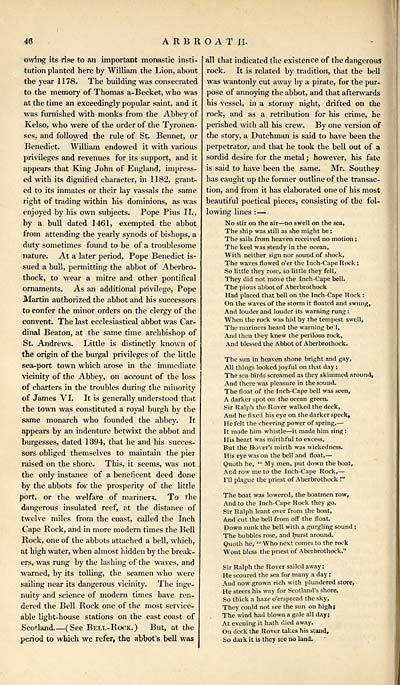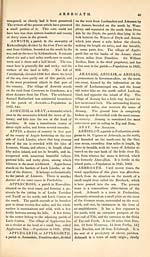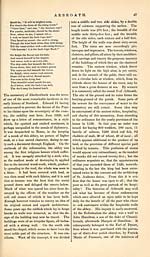Gazetteer of Scotland > Volume 1
(74) Page 46
Download files
Complete book:
Individual page:
Thumbnail gallery: Grid view | List view

46
ARBROATH.
owing its rise to an important monastic insti-
tution planted here by William the Lion, about
the year 1178. The building was consecrated
to the memory of Thomas a-Becket, who was
at the time an exceedingly popular saint, and it
was furnished with monks from the Abbey of
Kelso, who were of the order of the Tyronen-
ses, and followed the rule of St. Bennet, or
Benedict. William endowed it with various
privileges and revenues for its support, and it
appears that King John of England, impress-
ed with its dignified character, in 1182, grant-
ed to its inmates or their lay vassals the same
right of trading within his dominions, as was
enjoyed by his own subjects. Pope Pius II.,
by a bull dated 1461, exempted the abbot
from attending the yearly synods of bishops, a
duty sometimes found to be of a troublesome
nature. At a later period, Pope Benedict is-
sued a bull, permitting the abbot of Aberbro-
thock, to wear a mitre and other pontifical
ornaments. As an additional privilege, Pope
Martin authorized the abbot and his successors
to confer the minor orders on the clergy of the
convent. The last ecclesiastical abbot was Car-
dinal Beaton, at the same time archbishop of
St. Andrews. Little is distinctly known of
the origin of the burgal privileges of the little
sea-port town which arose in the immediate
vicinity of the Abbey, on account of the loss
of charters in the troubles during the minority
of James VI. It is generally understood that
the town was constituted a royal burgh by the
same monarch who founded the abbey. It
appears by an indenture betwixt the abbot and
burgesses, dated 1394, that he and his succes-
sors obliged themselves to maintain the pier
raised on the shore. This, it seems, was not
the only instance of a beneficent deed done
by the abbots fov the prosperity of the little
port, or the welfare of mariner?. To the
dangerous insulated reef, at the distance of
twelve miles from the coast, called the Inch
Cape Rock, and in more modern times the Bell
Rock, one of the abbots attached a bell, which,
at high water, when almost hidden by the break-
ers, was rung by the lashing of the waves, and
warned, by its tolling, the seamen who were
sailing near its dangerous vicinity. The inge-
nuity and science of modern times have ren-
dered the Bell Rock one of the most service-
able light-house stations on the east coast of
Scotland (See Bell- Rock.) But, at the
period to which we refer, the abbot's bell was
all that indicated the existence of the dangerous
rock. It is related by tradition, that the bell
was wantonly cut away by a pirate, for the pur-
pose of annoying the abbot, and that afterwards
his vessel, in a stormy night, drifted on the
rock, and as a retribution for his crime, he
perished with all his crew. By one version of
the story, a Dutchman is said to have been the
perpetrator, and that he took the bell out of a
sordid desire for the metal ; however, his fate
is said to have been the same. Mr. Southey
has caught up the former outline of the transac-
tion, and from it has elaborated one of his most
beautiful poetical pieces, consisting of the fol-
lowing lines : —
No stir on the air — no swell on the sea,
The ship was still as she might be ;
The sails from heaven received no motion ;
The keel was steady in the ocean,
With neither sign nor sound of shock,
The waves flowed o'er the Inch-Cape Rock ;
So little they rose, so little they fell,
They did not move the Inch-Cape bell.
The pious abbot of Aberbrothock
Had placed that bell on the Inch-Cape Rock :
On the waves of the storm it floated and swung.
And louder and louder its warning rung :
When the rock was hid by the tempest swell,
The mariners heard the warning beU,
And then they knew the perilous rock,
And blessed the Abbot of Aberbrothock.
The sun in heaven shone bright and gay,
All things looked joyful on that day ;
The sea-birds screamed as they skimmed around,
And there was pleasure in the sound.
The float of the Inch-Cape bell was seen,
A darker spot on the ocean green.
Sir Ralph the Rover walked the deck,
And he fixed his eye on the darker speck,
He felt the cheering power of spring, —
It made him whistle — it made him sing :
His heart was mirthful to excess,
But the Rover's mirth was wickedness.
His eye was on the bell and float, —
Quoth he, " My men, put down the boat,
And row me to the Inch-Cape Rock, —
I'll plague the priest of Aberbrothock !"
The boat was lowered, the boatmen row,
And to the Inch-Cape Rock they go.
Sir Ralph leant over from the boat,
And cut the bell from off the float.
Down sunk the bell with a gurgling sound ;
The bubbles rose, and burst around.
Quoth he, "Who next comes to the rock
Wont bless the priest of Aberbrothock."
Sir Ralph the Rover sailed away ;
He scoured the sea for many a day ;
And now grown rich with plundered store,
He steers his way for Scotland's shore.
So thick a haze o'ersprcad the sky,
They could not see the sun on high;
The wind had blown a gale all day;
At evening it hath died away.
On deck the Rover take* his stand.
So dark it is they see no land.
ARBROATH.
owing its rise to an important monastic insti-
tution planted here by William the Lion, about
the year 1178. The building was consecrated
to the memory of Thomas a-Becket, who was
at the time an exceedingly popular saint, and it
was furnished with monks from the Abbey of
Kelso, who were of the order of the Tyronen-
ses, and followed the rule of St. Bennet, or
Benedict. William endowed it with various
privileges and revenues for its support, and it
appears that King John of England, impress-
ed with its dignified character, in 1182, grant-
ed to its inmates or their lay vassals the same
right of trading within his dominions, as was
enjoyed by his own subjects. Pope Pius II.,
by a bull dated 1461, exempted the abbot
from attending the yearly synods of bishops, a
duty sometimes found to be of a troublesome
nature. At a later period, Pope Benedict is-
sued a bull, permitting the abbot of Aberbro-
thock, to wear a mitre and other pontifical
ornaments. As an additional privilege, Pope
Martin authorized the abbot and his successors
to confer the minor orders on the clergy of the
convent. The last ecclesiastical abbot was Car-
dinal Beaton, at the same time archbishop of
St. Andrews. Little is distinctly known of
the origin of the burgal privileges of the little
sea-port town which arose in the immediate
vicinity of the Abbey, on account of the loss
of charters in the troubles during the minority
of James VI. It is generally understood that
the town was constituted a royal burgh by the
same monarch who founded the abbey. It
appears by an indenture betwixt the abbot and
burgesses, dated 1394, that he and his succes-
sors obliged themselves to maintain the pier
raised on the shore. This, it seems, was not
the only instance of a beneficent deed done
by the abbots fov the prosperity of the little
port, or the welfare of mariner?. To the
dangerous insulated reef, at the distance of
twelve miles from the coast, called the Inch
Cape Rock, and in more modern times the Bell
Rock, one of the abbots attached a bell, which,
at high water, when almost hidden by the break-
ers, was rung by the lashing of the waves, and
warned, by its tolling, the seamen who were
sailing near its dangerous vicinity. The inge-
nuity and science of modern times have ren-
dered the Bell Rock one of the most service-
able light-house stations on the east coast of
Scotland (See Bell- Rock.) But, at the
period to which we refer, the abbot's bell was
all that indicated the existence of the dangerous
rock. It is related by tradition, that the bell
was wantonly cut away by a pirate, for the pur-
pose of annoying the abbot, and that afterwards
his vessel, in a stormy night, drifted on the
rock, and as a retribution for his crime, he
perished with all his crew. By one version of
the story, a Dutchman is said to have been the
perpetrator, and that he took the bell out of a
sordid desire for the metal ; however, his fate
is said to have been the same. Mr. Southey
has caught up the former outline of the transac-
tion, and from it has elaborated one of his most
beautiful poetical pieces, consisting of the fol-
lowing lines : —
No stir on the air — no swell on the sea,
The ship was still as she might be ;
The sails from heaven received no motion ;
The keel was steady in the ocean,
With neither sign nor sound of shock,
The waves flowed o'er the Inch-Cape Rock ;
So little they rose, so little they fell,
They did not move the Inch-Cape bell.
The pious abbot of Aberbrothock
Had placed that bell on the Inch-Cape Rock :
On the waves of the storm it floated and swung.
And louder and louder its warning rung :
When the rock was hid by the tempest swell,
The mariners heard the warning beU,
And then they knew the perilous rock,
And blessed the Abbot of Aberbrothock.
The sun in heaven shone bright and gay,
All things looked joyful on that day ;
The sea-birds screamed as they skimmed around,
And there was pleasure in the sound.
The float of the Inch-Cape bell was seen,
A darker spot on the ocean green.
Sir Ralph the Rover walked the deck,
And he fixed his eye on the darker speck,
He felt the cheering power of spring, —
It made him whistle — it made him sing :
His heart was mirthful to excess,
But the Rover's mirth was wickedness.
His eye was on the bell and float, —
Quoth he, " My men, put down the boat,
And row me to the Inch-Cape Rock, —
I'll plague the priest of Aberbrothock !"
The boat was lowered, the boatmen row,
And to the Inch-Cape Rock they go.
Sir Ralph leant over from the boat,
And cut the bell from off the float.
Down sunk the bell with a gurgling sound ;
The bubbles rose, and burst around.
Quoth he, "Who next comes to the rock
Wont bless the priest of Aberbrothock."
Sir Ralph the Rover sailed away ;
He scoured the sea for many a day ;
And now grown rich with plundered store,
He steers his way for Scotland's shore.
So thick a haze o'ersprcad the sky,
They could not see the sun on high;
The wind had blown a gale all day;
At evening it hath died away.
On deck the Rover take* his stand.
So dark it is they see no land.
Set display mode to: Large image | Transcription
Images and transcriptions on this page, including medium image downloads, may be used under the Creative Commons Attribution 4.0 International Licence unless otherwise stated. ![]()
| Gazetteers of Scotland, 1803-1901 > Gazetteer of Scotland > Volume 1 > (74) Page 46 |
|---|
| Permanent URL | https://digital.nls.uk/97425250 |
|---|
| Description | Volume I: Abbey to Glenartney. |
|---|---|
| Attribution and copyright: |
|
| Description | By Robert Chambers and William Chambers. Glasgow: Blackie & Son, 1838. 2 volumes. |
|---|---|
| Shelfmark | NF.1461.g.7 |
| Additional NLS resources: | |

